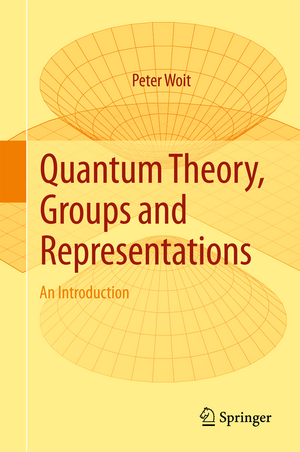Quantum Theory, Groups and Representations: An Introduction
Autor Peter Woiten Limba Engleză Hardback – 9 noi 2017
| Toate formatele și edițiile | Preț | Express |
|---|---|---|
| Paperback (1) | 546.81 lei 6-8 săpt. | |
| Springer International Publishing – 18 mai 2018 | 546.81 lei 6-8 săpt. | |
| Hardback (1) | 551.71 lei 3-5 săpt. | |
| Springer International Publishing – 9 noi 2017 | 551.71 lei 3-5 săpt. |
Preț: 551.71 lei
Preț vechi: 649.07 lei
-15% Nou
Puncte Express: 828
Preț estimativ în valută:
105.58€ • 109.08$ • 87.82£
105.58€ • 109.08$ • 87.82£
Carte disponibilă
Livrare economică 26 februarie-12 martie
Preluare comenzi: 021 569.72.76
Specificații
ISBN-13: 9783319646107
ISBN-10: 3319646109
Pagini: 668
Ilustrații: XXII, 668 p. 27 illus.
Dimensiuni: 155 x 235 x 45 mm
Greutate: 1.09 kg
Ediția:1st ed. 2017
Editura: Springer International Publishing
Colecția Springer
Locul publicării:Cham, Switzerland
ISBN-10: 3319646109
Pagini: 668
Ilustrații: XXII, 668 p. 27 illus.
Dimensiuni: 155 x 235 x 45 mm
Greutate: 1.09 kg
Ediția:1st ed. 2017
Editura: Springer International Publishing
Colecția Springer
Locul publicării:Cham, Switzerland
Cuprins
Preface.- 1 Introduction and Overview.- 2 The Group U(1) and its Representations.- 3 Two-state Systems and SU(2).- 4 Linear Algebra Review, Unitary and Orthogonal Groups.- 5 Lie Algebras and Lie Algebra Representations.- 6 The Rotation and Spin Groups in 3 and 4 Dimensions.- 7 Rotations and the Spin 1/2 Particle in a Magnetic Field.- 8 Representations of SU(2) and SO(3).- 9 Tensor Products, Entanglement, and Addition of Spin.- 10 Momentum and the Free Particle.- 11 Fourier Analysis and the Free Particle.- 12 Position and the Free Particle.- 13 The Heisenberg group and the Schrödinger Representation.- 14 The Poisson Bracket and Symplectic Geometry.- 15 Hamiltonian Vector Fields and the Moment Map.- 16 Quadratic Polynomials and the Symplectic Group.- 17 Quantization.- 18 Semi-direct Products.- 19 The Quantum Free Particle as a Representation of the Euclidean Group.- 20 Representations of Semi-direct Products.- 21 Central Potentials and the Hydrogen Atom.- 22 The Harmonic Oscillator.- 23 Coherent States and the Propagator for the Harmonic Oscillator.- 24 The Metaplectic Representation and Annihilation and Creation Operators, d = 1.- 25 The Metaplectic Representation and Annihilation and Creation Operators, arbitrary d.- 26 Complex Structures and Quantization.- 27 The Fermionic Oscillator.- 28 Weyl and Clifford Algebras.- 29 Clifford Algebras and Geometry.- 30 Anticommuting Variables and Pseudo-classical Mechanics.- 31 Fermionic Quantization and Spinors.- 32 A Summary: Parallels Between Bosonic and Fermionic Quantization.- 33 Supersymmetry, Some Simple Examples.- 34 The Pauli Equation and the Dirac Operator.- 35 Lagrangian Methods and the Path Integral.- 36 Multi-particle Systems: Momentum Space Description.- 37 Multi-particle Systems and Field Quantization.- 38 Symmetries and Non-relativistic Quantum Fields.- 39 Quantization of Infinite dimensional Phase Spaces.- 40 Minkowski Space and the Lorentz Group.- 41Representations of the Lorentz Group.- 42 The Poincaré Group and its Representations.- 43 The Klein-Gordon Equation and Scalar Quantum Fields.- 44 Symmetries and Relativistic Scalar Quantum Fields.- 45 U(1) Gauge Symmetry and Electromagnetic Field.- 46 Quantization of the Electromagnetic Field: the Photon.- 47 The Dirac Equation and Spin-1/2 Fields.- 48 An Introduction to the Standard Model.- 49 Further Topics.- A Conventions.- B Exercises.- Index.
Recenzii
“The book presents a large variety of important subjects, including the basic principles of quantum mechanics … . This good book is recommended for mathematicians, physicists, philosophers of physics, researchers, and advanced students in mathematics and physics, as well as for readers with some elementary physics, multivariate calculus and linear algebra courses.” (Michael M. Dediu, Mathematical Reviews, June, 2018)
Notă biografică
Peter Woit is a Senior Lecturer of Mathematics at Columbia University. His general area of research interest is the relationship between mathematics, especially representation theory, and fundamental physics, especially quantum field theories like the Standard Model.
Textul de pe ultima copertă
This text systematically presents the basics of quantum mechanics, emphasizing the role of Lie groups, Lie algebras, and their unitary representations. The mathematical structure of the subject is brought to the fore, intentionally avoiding significant overlap with material from standard physics courses in quantum mechanics and quantum field theory. The level of presentation is attractive to mathematics students looking to learn about both quantum mechanics and representation theory, while also appealing to physics students who would like to know more about the mathematics underlying the subject. This text showcases the numerous differences between typical mathematical and physical treatments of the subject. The latter portions of the book focus on central mathematical objects that occur in the Standard Model of particle physics, underlining the deep and intimate connections between mathematics and the physical world. While an elementary physics course of some kind would be helpful tothe reader, no specific background in physics is assumed, making this book accessible to students with a grounding in multivariable calculus and linear algebra. Many exercises are provided to develop the reader's understanding of and facility in quantum-theoretical concepts and calculations.
Caracteristici
Systematically emphasizes the role of Lie groups, Lie algebras, and their unitary representation theory in the foundations of quantum mechanics Introduces fundamental structures and concepts of representation theory in an elementary, physically relevant context Gives a careful treatment of the mathematical subtleties of quantum theory, without obscuring its global mathematical shape Includes supplementary material: sn.pub/extras
